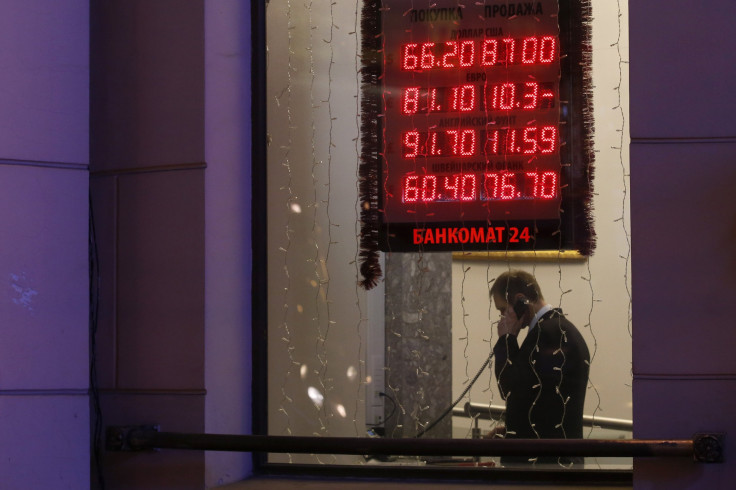Russia Ruble Crisis 2014: Potential Economic Collapse, Panic Over Future Of Banking System Follows Currency Tumble

Panic washed over Russia Tuesday as the value of the ruble dropped as much as 19 percent in one day, with Russians reportedly flooding currency exchange centers and retailers as they tried to swap their cash for anything that might have more value. Russian stocks dropped amid concerns that business leaders would pull deposits from banks and as the cost of imports soared. "The economy is probably in recession and that will accelerate from here, and there are possible risks of a deposit run,” Anton Khmelnitski, director of EC Elbrus Capital Investments in Kiev, told Bloomberg.
Russia's central bank has tried to assuage fears by using its stockpile of currency reserves to buy rubles and prop up its value. It announced Tuesday an increased benchmark interest rate of 17 percent, up from 10.5 percent, effective immediately. "The situation is critical," Russian central bank Deputy Chairman Sergei Shvetsov told reporters. "Even in your nightmares a year ago, you would not have imagined what is happening now."
Russian President Vladimir Putin is scheduled Thursday to address the currency crisis in an annual live-TV call-in show. It's unclear what measures Russia will take next to stop threats of an economic collapse. One theory is that officials will place limits on the amount of foreign currency that can be withdrawn from banks, according to The Moscow Times. "The regulator is being torn apart by its former liberal policies and the new reality — market players expect capital controls," Alexei Golubovich, founder of investment management firm Arbat Capital, said in a commentary for Russian business website RBC Tuesday.
Russia has been hit hard by a drop in oil prices and economic sanctions from the European Union and the U.S. over its ongoing support of rebel separatists in Ukraine. The sanctions included restrictions on oil giant Rosneft and Russia's third-largest bank Gazprombank OAO.
"Going forward, Russia will require significant economic reforms. Economic diversification is what Russia should aim for and shed its tag of 'oil-dependent economy,' a Nasdaq analysis concluded Tuesday. "President Vladimir Putin's proposal for tax breaks for the small-business sector is probably on those lines. Nonetheless, Russia has a lot to be worried about, among which, deteriorating economy and high inflation threatens a decline in real income."
Some Russian officials have tried to underplay the potential economic crisis. Andrey Makarov, chairman of the budget and state committee in the State Duma, urged parliament members on Tuesday to support local banks. "It is important now to stop the panic, which is being artificially instigated, and understand that the central bank has done everything possible using the instruments provided to it," he said. "We should make people confident that nothing will happen to the banking system. This is because always the most frightening danger is when anxiety and panic push people to make runs on bank deposits. This is an attempt to destabilize the economic situation and consequently destabilize the political situation in the country.”
Other government officials are ringing warning bells. Aleksei L. Kudrin, a former finance minister, wrote on Twitter that “the fall of the ruble and the stock market is not just a reaction to the low price of oil and to sanctions, but also due to a lack of confidence in the government’s economic policy.”
Outside Russia, onlookers have determined that the panic is warranted. "The end is near for Russia's economic and financial stability," said Carl Weinberg, chief economist with High Frequency Economics, according to CBS News. "This is an unrecoverable spiral. The combination of economic and financial sanctions by NATO governments and the crash of global oil prices has killed Russia's economy."
There is also some concern that Russia's economic slowdown would hurt markets in China, Europe and eventually the U.S. What this all means for Putin is unclear.
"His approval ratings are still very high because of his perceived handling of the crisis in Ukraine," Liza Ermolenko, an emerging markets economist at Capital Economics in London, told USA Today. "It's going to take some time before people in Russia realize what is going on with the economy."
© Copyright IBTimes 2024. All rights reserved.






















